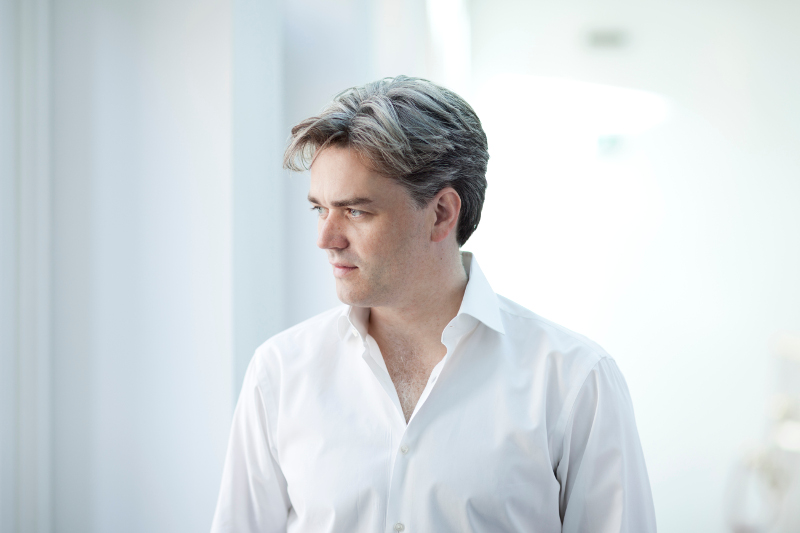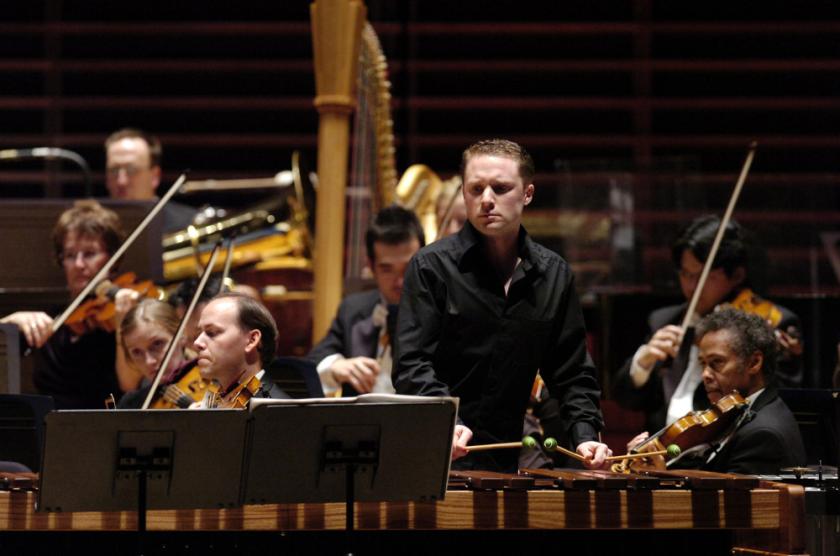On paper it looked like it would be very much a concert of two halves. James MacMillan’s energetic, glittering Second Percussion Concerto was unveiled last year and received its first UK performance in London last December, and it was getting its premiere in the composer’s homeland at this Edinburgh International Festival concert from its dedicatee, percussionist Colin Currie, and the Royal Scottish National Orchestra. And in the second half, something entirely different: Sibelius’s rarely performed, hugely expansive choral symphony Kullervo.
What brought the two contrasting works together – and made the concert such a hugely rewarding experience – was the musical personality of conductor Edward Gardner (pictured below). You could tell he’s had years in the opera pit: he tackled both pieces with a keen sense of storytelling, leading the listener through their vivid musical descriptions and shifting moods expertly. He drove the RSNO onwards with some urgent direction – but he was crystal clear, and precise in his demands. And in response, the Orchestra showed what it was capable of in thrillingly broad, sweeping playing, committed and secure.
It was Edinburgh-born Colin Currie, however, who was the real showman in the concert’s first half, but despite the muscular athleticism of MacMillan’s percussion writing – which had Currie leaping from one end of a marimba to the other, or scampering across stage to reach an alternative set of instruments – he hardly seemed to break a sweat. It felt like the music was in his bones – and MacMillan’s energetic, assertive writing likewise felt the ideal match for his enthusiastic musical personality. Indeed, the piece is classic MacMillan in many ways – violently propulsive passages yielding to intense introspection, lyrical yet angular, with nods to spirituality in slow-moving brass chorales. But it’s no less effective for that. A duet for viola (delivered lithely by the RSNO’s principal, Tom Dunn) and Currie on steel pan was unexpectedly beguiling, and MacMillan’s sense of dramatic pacing was spot-on. There were an awful lot of notes to take in – in fact, some of Currie’s propulsive runs up and down his instruments, though virtuosic, felt a bit like texture-filling – but it was a thoroughly convincing performance of what’s sure to become a fixture in the percussion repertoire.
 And despite its cheery story, taken from the epic Finnish Kalevala, of abuse, incest, rape, revenge and suicide, in Gardner’s hands, Sibelius’s enormous Kullervo sounded like a confident celebration of the nation’s identity, a resounding acceptance of both darkness and light. He took his time over things, allowing the drama to unfold with Brucknerian expansiveness, but with his keen dramatic pacing and piquant details, it never felt sluggish. The concert’s chorus – brought together from the gentlemen of the Edinburgh Festival Chorus and RSNO Chorus (Sibelius thought it unseemly to have women sing of matters of the flesh) – sounded at first a bit hesitant in the chant-like declamations of the cataclysmic third movement, telling of the hero Kullervo’s rape of his sister, finding bolder confidence when their textures filled out from bare octaves to thicker harmonies. By the end, it felt like an undeniably long, demanding work, but with Gardner’s expert handling of Sibelius’s huge blocks of orchestra sound, one that grew to a sense of affirmation.
And despite its cheery story, taken from the epic Finnish Kalevala, of abuse, incest, rape, revenge and suicide, in Gardner’s hands, Sibelius’s enormous Kullervo sounded like a confident celebration of the nation’s identity, a resounding acceptance of both darkness and light. He took his time over things, allowing the drama to unfold with Brucknerian expansiveness, but with his keen dramatic pacing and piquant details, it never felt sluggish. The concert’s chorus – brought together from the gentlemen of the Edinburgh Festival Chorus and RSNO Chorus (Sibelius thought it unseemly to have women sing of matters of the flesh) – sounded at first a bit hesitant in the chant-like declamations of the cataclysmic third movement, telling of the hero Kullervo’s rape of his sister, finding bolder confidence when their textures filled out from bare octaves to thicker harmonies. By the end, it felt like an undeniably long, demanding work, but with Gardner’s expert handling of Sibelius’s huge blocks of orchestra sound, one that grew to a sense of affirmation.













Add comment